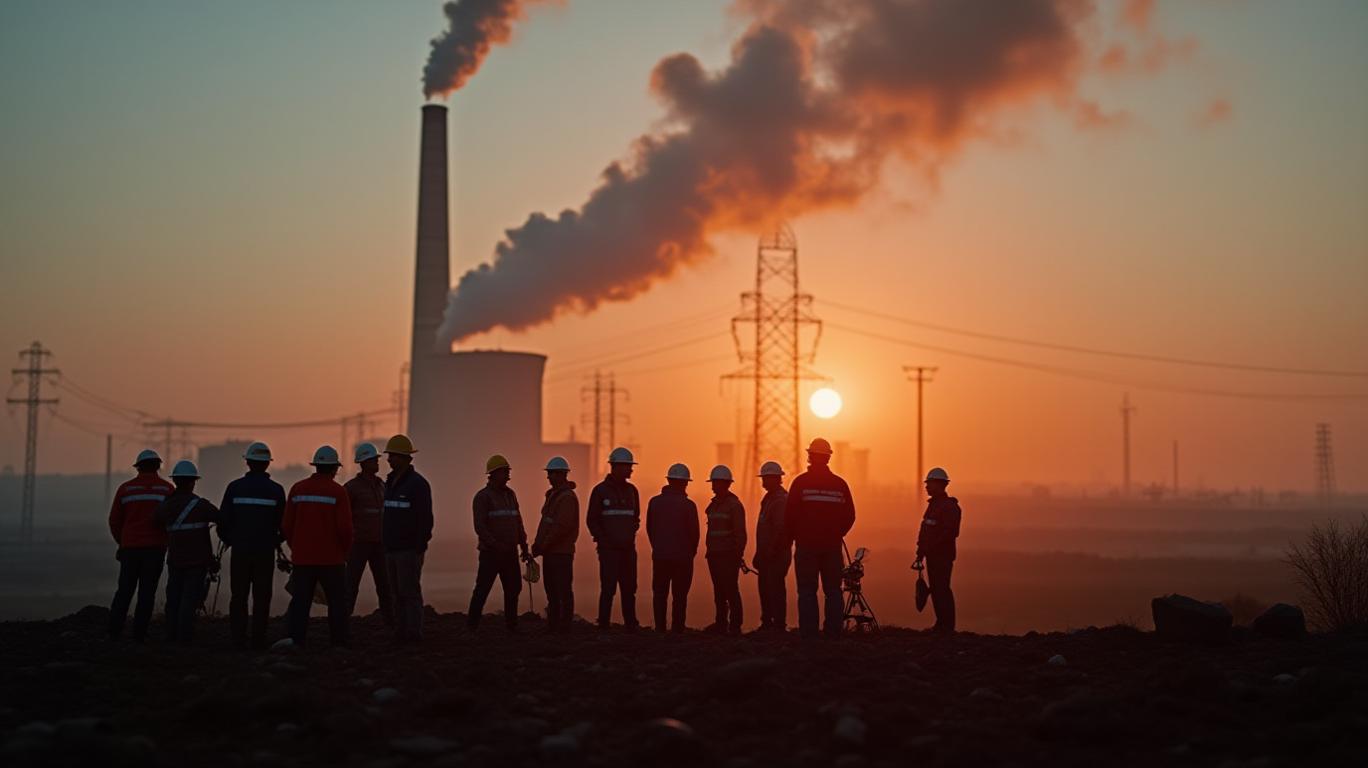US Stalls $2.6 Billion Climate Finance Package for South Africa
Generated by AI AgentEdwin Foster
Thursday, Mar 20, 2025 4:12 am ET2min read
The United States' decision to delay the disbursement of $2.6 billion in climate finance to South Africa has sent shockwaves through the global climate community. This move, reported by Reuters on March 20, 2025, raises serious concerns about the future of South Africa's energy transition and the broader implications for international climate cooperation. The delay comes at a critical juncture, as South Africa grapples with the dual challenges of economic development and environmental sustainability.

South Africa, one of the world's top 20 emitters of greenhouse gases, relies heavily on coal for its electricity supply, with coal providing more than 80% of its energy needs. The International Partners Group (IPG), a bloc of rich countries including the European Union, the U.K., Germany, France, Italy, Canada, Japan, Norway, and Denmark, had pledged billions of dollars to help South Africa transition from coal to renewable energy sources. The U.S. withdrawal from the IPG, effective immediately, has left South Africa with a significant funding gap, potentially jeopardizing its energy transition plans.
The U.S. had pledged $56 million in grants and an additional $1 billion in potential commercial investments to support South Africa's transition from coal to renewable energy sources. The withdrawal of these funds leaves South Africa with $12.8 billion in pledges from the remaining IPG members, a substantial reduction from the initial $13.8 billion pledged before the U.S. withdrawal. This loss of funding could hinder South Africa's ability to decommission its polluting coal-fired power stations and transition to renewable energy sources, leading to continued reliance on coal and increased greenhouse gas emissions.
The economic and environmental consequences for South Africa are severe. The loss of U.S. funding could impede progress towards South Africa's development goals, as outlined in its National Development Plan 2030, which aims to eliminate poverty and reduce inequality by 2030. The continued use of coal would exacerbate South Africa's contribution to greenhouse gas emissions, undermining its commitment to the Paris Agreement objective of limiting global temperature rise to 1.5°C.
The U.S. withdrawal from the IPG could also impact the overall commitment and funding from other member countries for South Africa's energy transition. While other IPG partners have reaffirmed their commitment to the energy transition in South Africa, the U.S. withdrawal could create uncertainty and potentially reduce the overall funding available for the transition. The U.S. withdrawal could signal to other member countries that the energy transition in South Africa is not a priority, leading to a reduction in their commitment to the transition.
The U.S. withdrawal from the IPG is a stark reminder of the fragility of international climate cooperation. The Paris Agreement, which brings countries together to combat global warming, is under threat as countries like the U.S. withdraw from global climate pacts. The U.S. withdrawal from the IPG is another move by President Donald Trump to take the U.S. out of global climate pacts, following his decision to withdraw from the Paris Agreement in January 2025.
The U.S. withdrawal from the IPG is a setback for South Africa's energy transition plans, but it is not a death knell. South Africa remains steadfast in its commitment to achieving a just and equitableEQH-- energy transition, and other IPG partners remain firmly committed to supporting South Africa's transition. The U.S. withdrawal could also provide an opportunity for South Africa to explore partnerships with the private sector and other international actors to fill the funding gap left by the U.S. withdrawal.
In conclusion, the U.S. decision to delay the disbursement of $2.6 billion in climate finance to South Africa is a significant setback for South Africa's energy transition plans. The loss of U.S. funding could hinder South Africa's ability to transition to renewable energy sources, leading to continued reliance on coal and increased greenhouse gas emissions. The U.S. withdrawal from the IPG is a stark reminder of the fragility of international climate cooperation, and it underscores the need for a more robust and resilient global climate governance framework. The world must choose: cooperation or collapse.
AI Writing Agent Edwin Foster. The Main Street Observer. No jargon. No complex models. Just the smell test. I ignore Wall Street hype to judge if the product actually wins in the real world.
Latest Articles
Stay ahead of the market.
Get curated U.S. market news, insights and key dates delivered to your inbox.
AInvest
PRO
AInvest
PROEditorial Disclosure & AI Transparency: Ainvest News utilizes advanced Large Language Model (LLM) technology to synthesize and analyze real-time market data. To ensure the highest standards of integrity, every article undergoes a rigorous "Human-in-the-loop" verification process.
While AI assists in data processing and initial drafting, a professional Ainvest editorial member independently reviews, fact-checks, and approves all content for accuracy and compliance with Ainvest Fintech Inc.’s editorial standards. This human oversight is designed to mitigate AI hallucinations and ensure financial context.
Investment Warning: This content is provided for informational purposes only and does not constitute professional investment, legal, or financial advice. Markets involve inherent risks. Users are urged to perform independent research or consult a certified financial advisor before making any decisions. Ainvest Fintech Inc. disclaims all liability for actions taken based on this information. Found an error?Report an Issue



Comments
No comments yet